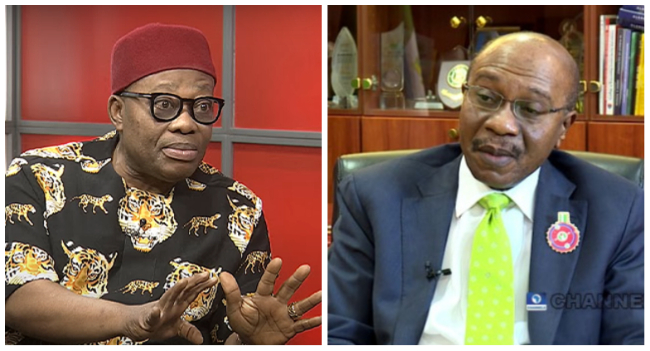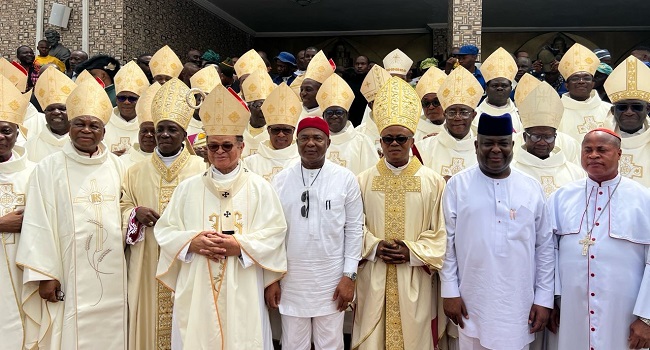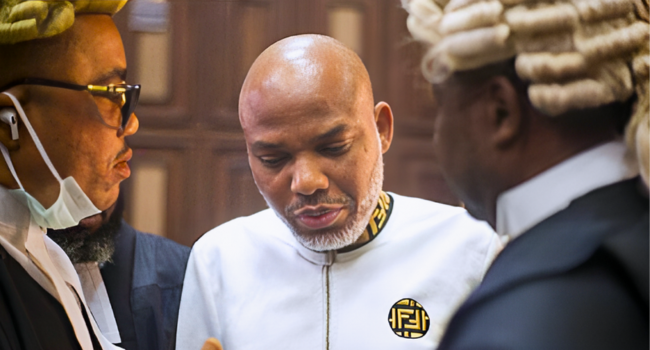The approach of the Department of State Services in trying to arrest the Governor of the Central Bank of Nigeria, Godwin Emefiele is “fraudulent,” the Chairman, Section of Public Interest and Development (SPIDEL) of the Nigerian Bar Association (NBA), Monday Ubani said on Tuesday.
Ubani expressed his criticism during a live appearance on Channels Television’s Sunrise Daily in the wake of an ex parte motion by the DSS to arrest and detain Emefiele.
Declining the application on Monday, the Chief Judge of the Federal High Court, Justice John Tsoho said the secret police did not provide any concrete evidence to substantiate its claims that Emefiele was involved in terrorism financing and economic crimes.
At the proceeding, the Judge noted that the name of the respondent was given simply as ‘Godwin Emefiele’ without a material disclosure that he is the same person as the CBN governor.
Ubani compared the case against Emefiele to that of a former Chief Justice of Nigeria (CJN), Walter Onnoghen, who on April 18, 2019 was convicted by the Code of Conduct Tribunal (CCT) on six counts of false declaration of assets and banned from holding any public office for the next 10 years.
“Let’s begin to sanitise our system and let the right thing be done,” Ubani said. “You are going to arrest a CBN governor; you never even disclosed his identity to the court. That is even fraudulent in the first place – it was not mentioned that ‘this is the central bank governor.’ We are doing things wrongly – the way Onnoghen was removed.”
READ ALSO: Withdrawal Limits: Again, Emefiele Fails To Appear Before Reps
He took issue with what he described as a “blanket allegation” of “terrorism,” adding that the court is in a position to exercise discretion regarding the claims brought before it.
“Oh, because of the word ‘terrorism’, the judge becomes afraid that you have used the word ‘terrorism’? No! What are the facts that will now make me abridge this man’s rights? If it’s not there, it’s not there. So, the court should not go ahead and begin to fear the word ‘terrorism.’
“What are the things that constitute terrorism in the act you are alleging, so that the court can now be in a position to exercise discretion? But it shouldn’t be applicable only to the big men. Any man can be a victim tomorrow.
“When we stay here and begin to talk about fundamental human rights, we are preaching it to everyone. You are in a position of authority today; tomorrow, you become an ordinary citizen who can also become a victim of the system if you don’t get it right,” he said.
Describing the allegations as grave, the lawyer argued that in going to court to seek the CBN governor’s arrest and detention, the court is called upon to exercise “discretionary power.” For the court to do so, he said, the plaintiff must place “sufficient material” before it, especially in terms of ex parte applications often used by security agencies to allegedly infringe on the rights of citizens.
“(Emefiele) is not given an opportunity to come and represent himself to counter whatever allegation you have put up. This is a one-sided allegation. And you are now asking the court to act on that one-sided allegation. What are the sufficient materials presented before the court?
“I am very happy that the court, through this case, is establishing a proper jurisprudence. There should even be an enactment to guide the courts in cases like this where they are being asked to exercise their discretion to infringe on a guaranteed right.
“The man is not there, you are putting up this allegation, and you want the court to detain him even beyond the constitutionally guaranteed time – 24 hours. You are asking him to be detained for 60 days – or 45 days, like in the case of (Omoyele) Sowore and you are not presenting any sufficient evidence?
“We have this character: it is from the office of the President. It’s from the office of DSS. It’s from the Office of EFCC. And so what? Are they not supposed to do the right thing in order to convince an arm of government that is different for it to exercise discretion?” he said.
Commending the court judgement, Ubani stated that it was “the way we ought to go,” adding that the same principle must be applied across the board, regardless of the defendant’s socio-economic status.




